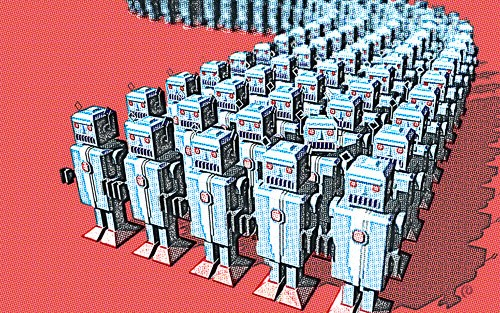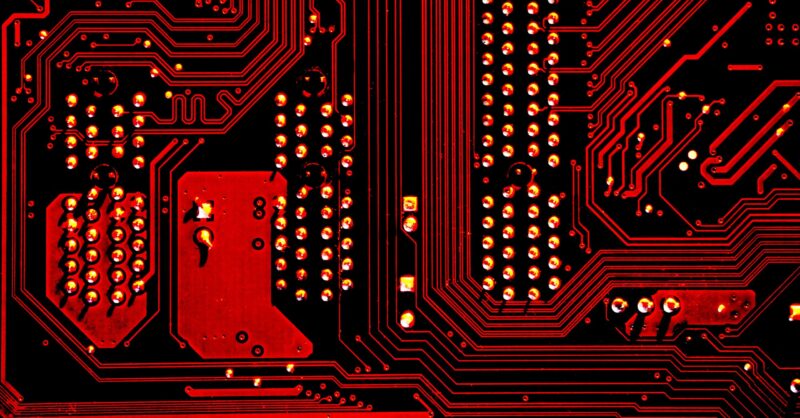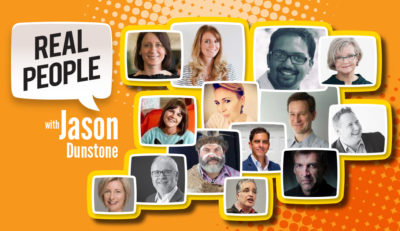Are the robots becoming human, or the humans becoming robots?
The robots are not just coming, they are living among us.
But we should not fear the robots, but the people becoming robots.
Robots are increasingly making our businesses and lives better, easier and even more fulfilled. The likes of Apple Siri and Google’s Virtual Assistant and Duplex are ever improving and will continue to exponentially evolve. Manufacturing robots such as Baxter to provide cost-effective options for low volume, high mix production jobs.
We may be not be quite be at the world of the Jetson’s and Rosie the Robot, but as Dr Phillip Alvelda noted in episode #8 of Real People Podcast …
“It is not a matter of if but when.” Dr Phillip Alvelda
There is no need to fear the robots, they will inevitably evolve and play a bigger part in our lives. Fear is futile we must embrace them.
As technologist, futurist et cetera Steve Sammartino wrote in his guest post ‘How to NOT fear ‘the Robots’ for squareholes.com/blog last year …
“The pace of change is super radical. It is not only moving fast, but it is actually accelerating. The fact that our technology is not only cheap but networked is creating a positive spiral of knowledge advancements. People building on each other’s developments and platforms in a way humanity has never done is allowing artificial intelligence, robotics and pretty much everything with digital cognition to exponentially improve. Technology isn’t just getting a little better, but doubling in effectiveness every year or so.” Steve Sammartino
Yet, we need not fear the robots.
Universities, commercial enterprises, governments and investors are coming together to bring human-like robots to the world as soon as possible. Anthropomorphic artificial intelligence and machine learning tools, digital twins, and synthetic personalities. Even if there are exceptionally clever people working world wide to advance Artificial Intelligence and Machine learning to move the the robots from process driven tasks to understanding context, reading emotions and becoming more human.
“When I say more human, I mean it in the sense that computers are very, very good and much better at many things. Calculations very fast—computer, no contest. And, now identifying faces in photos, computers are better. Understanding spoken language, computers are better. But if I asked you, is your daughter ready to drive to school next week? Computer has no hope. It requires context. What does it mean? Why is it important she drive? Has she not been able to drive before? What sort of training does she need? You have memories, experiences, context, as to what it means to drive. All these things are built in to implicit assumptions as to what we have discussed. And right now our computers don’t have any way to knit all that together. … One of the skills that is intrinsic to humans, that computers don’t really assess ‘is he having a good time, is he worried, is he tense,?’ But, we are just starting to write programs that will identify what your emotion might be. We’re just in the early stages of that. Now what will I do with that? How will I respond? Is it a simple ‘if then’ kind of programming statement … no.” Dr Phillip Alvelda on episode #8 of Real People Podcast
It is all very exciting, yet for many more so alarmingly scary. Where will will the jobs of the future come from? How will we live when the world is taken over by the robots? How we survive in a world of robots.
Again, we should not fear the robots. While robots may be great at making processes easier and analysing vasts amounts of data more effortlessly and much faster than humans — mathematics calculated like a machine. Automation of machine learning and artificial intelligence to provide greater access to analysis of patterns and synthesising these down to to an essence of key findings and statistics.
“It’s really about synthesising. Knowing how you recognise patterns across different pieces of research, or different pieces of information. Technology will help us with that. But then, it’s about here’s that synthesis, now ‘what does that mean?’ The ‘so what?’ is the key part of what we need to do as an insights function or anyone in the business situation. It’s like ‘here’s the data.’ What’s the ‘so what?’ ‘How do I put this into action?’ That’s what a piece of technology can’t do for us and I don’t think it should. We need to layer on top always that human element of emotion, understanding of the other elements that are part of the environment that go into that.” Kristi Zuhlke on Episode #9 of Real People
Humans are about thinking that robots are unlikely to be able to ever replace. Robots are good at processes, computation and clear analysis, yet likely poor well into the future at understanding context, and using imagination and creativity. Taking jumps of faith and take disparate information and experiences and making decisions in ambiguous situations.
As noted in an upcoming episode of Real People (next week) with Dr Fiona Kerr Industry Professor, Neural and Systems Complexity at University of Adelaide, the big difference with humans to robots is abstraction.
“Humans are really excellent at context and extrapolations. The big difference is abstraction, humans abstract. We’re able to take disparate information from all different kinds of places and make connections that seem completely big jumps. They are to do with a really interesting mixed bag of context and experience and imagination, and creativity. Which turns on multiple parts of our brain at once.” Dr Fiona Kerr on Real People
The world’s major inventions and innovations have all most likely come from abstraction. Typically based on solid research and analysis, then a leap of faith, and consequential experimentation, learning and iteration.
“Last year I was at Google and I was talking with Vint Cerf ( Vice President and Chief Internet Evangelist at Google since 2005). He said to me ‘so, if you had to choose one thing that is different between humans and artificial intelligence.’ And, I said abstraction. And he said ‘yes!’ We were on the same page. That way of being able to completely laterally jump.” Dr Fiona Kerr on Real People
This to some extent surely makes most take a sigh of relief, that humans will remain relevant into the future. There are things we do that robots will likely to struggle with well into the future, if not for ever — abstraction, imagination and creativity. Robots can take away the laborious processes, complex computation and the boring analysis humans are less efficient at.
Humans have a unique way of lateral thinking, and taking leaps of faith.
However, the problem with this is that our use of technology, our smart phones and even Google are reducing our need to think, to problem solve and to use our imagination, and for many social media addiction is removing time for critical day dreaming that allows our imagination and creativity to fly.
Society is becoming safer, as regulators put protections in place to make it easier to make the safe decision. Workplaces are being driving by increasing sales and other performance key performance indicators, workplace safety and other legislation means that it is vital steps and processes are followed to the letter. Profitability grows with cost efficiency, and typically the most efficient way to achieve this in large corporate and government is to have clear progress guidelines, steps and requirements. Divergent thinking, away from the herd is not encouraged, even with the innovation rhetoric, as thinking different can be viewed as inefficient.
We have all seen or experienced enthusiastic people with different thinking, be suffocated by their employers, transformed into robots without the machine learning and artificial intelligence. A lack of empowerment, and inability to drive change or even see their roles as fulfilling, with a level of autonomy. When you take away the ability to think, people become robots (without the superior intelligence).
Humans only keep their uniqueness to robots if they are allowed to use and evolve their strengths. The corporate and government bastards out there, do not care about the humans with abstraction, imagination and creativity. They are seeking nothing more than efficiency, profitability and reducing employment.
To remain relevant and prosper and retain our human strengths over robots is to work together. Not for the humans to compete with robots, but to work together to ensure our strengths and weaknesses are complimented.




